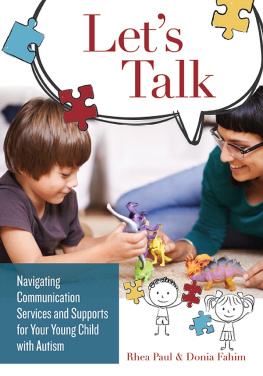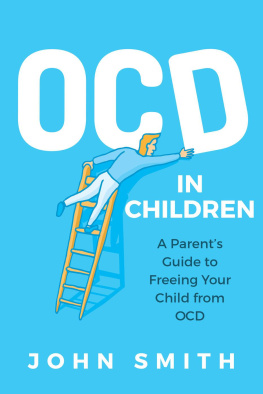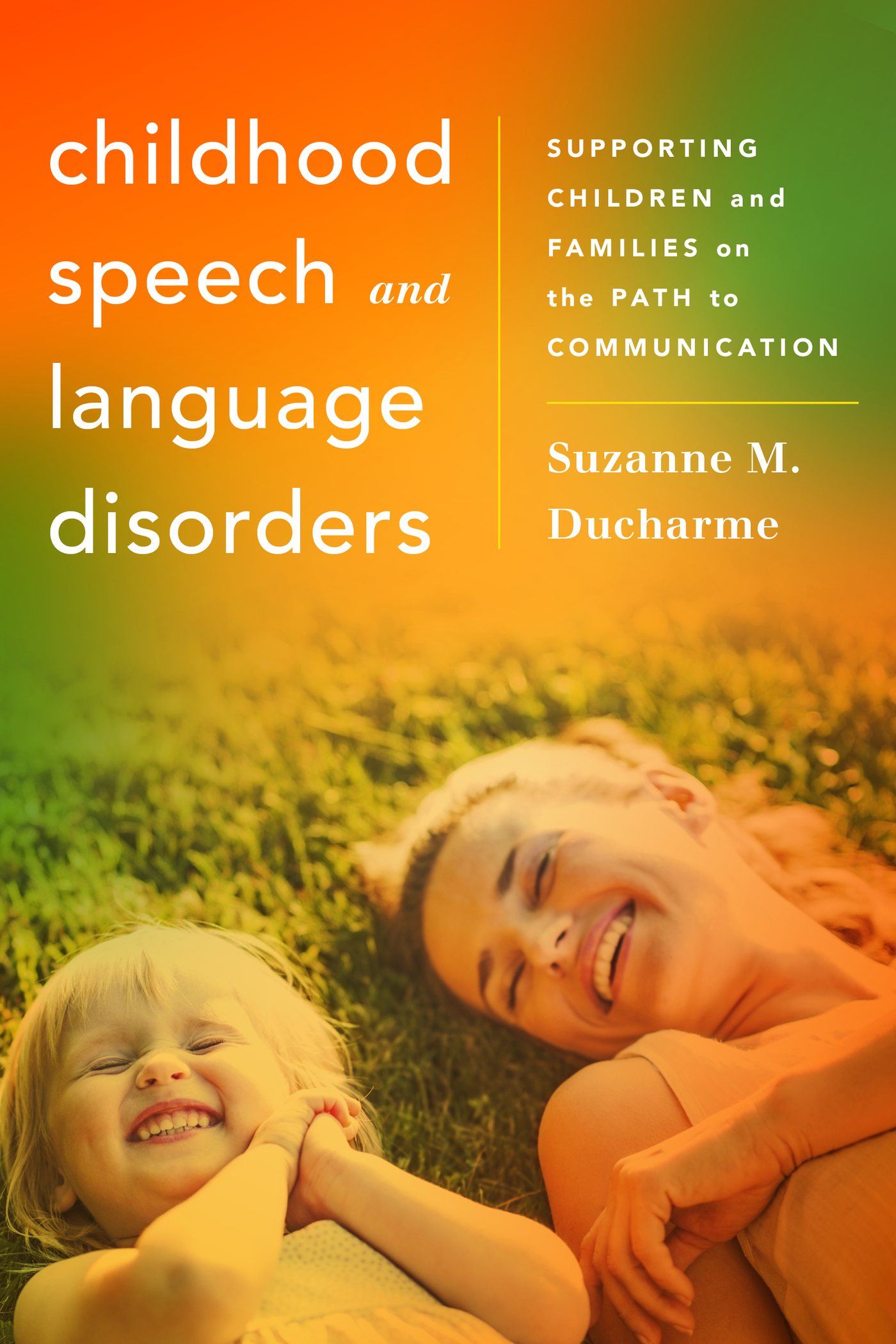Childhood Speech and
Language Disorders
Whole Family Approaches to Childhood
Illness and Disorders Series
Series Editor: Brian J. Fligor, ScD, board-certified audiologist and chief audiology officer at Lantos Technologies, Inc. brian.fligor@gmail.com
Whole Family Approaches to Childhood Illness and Disorders is a series of books authored by distinguished healthcare providers and developmental experts who focus on the whole familys experience when it comes to caring for a child with a particular health condition. Given that childhood illness and disability affects not just the child but also each member of the family, the care provided to the child must be done in the context of his family unit. Illness and disability in children occurs randomly, often without warning, and affects people of every race, religion, education, and economic status. When it happens, families are often in a state of chaos trying to negotiate multiple medical and therapy appointments, learning a whole new technical language around the condition, perhaps while grieving the diagnosis. Each book in this series serves as an opportunity for the author to share all of his or her wisdom with the reader, not just what can be covered in brief face-to-face meetings. Authors in this series provide important information about the condition, as well as pragmatic how to navigate this situation, while validating the readers emotions. It is the intent of this series to enlighten and support families as they blaze a trail to a new normal.
Titles in the Series
Understanding Childhood Hearing Loss: Whole Family Approaches to Living and Thriving, by Brian J. Fligor
Childhood Speech and Language Disorders: Supporting Children and Families on the Path to Communication, by Suzanne M. Ducharme
Childhood Speech and
Language Disorders
Supporting Children and Families on the Path to Communication
Suzanne M. Ducharme
ROWMAN & LITTLEFIELD
Lanham Boulder New York London
Published by Rowman & Littlefield
A wholly owned subsidiary of The Rowman & Littlefield Publishing Group, Inc.
4501 Forbes Boulevard, Suite 200, Lanham, Maryland 20706
www.rowman.com
Unit A, Whitacre Mews, 26-34 Stannary Street, London SE11 4AB
Copyright 2016 by Rowman & Littlefield
All rights reserved. No part of this book may be reproduced in any form or by any electronic or mechanical means, including information storage and retrieval systems, without written permission from the publisher, except by a reviewer who may quote passages in a review.
British Library Cataloguing in Publication Information Available
Library of Congress Cataloging-in-Publication Data
Names: Ducharme, Suzanne M., author.
Title: Childhood speech and language disorders : Supporting Children and Families on the Path to Communication / Suzanne M. Ducharme.
Description: Lanham : Rowman & Littlefield, [2016] | Series: Whole family approaches to childhood llness and disorders series | Includes bibliographical references and index.
Identifiers: LCCN 2016011434 (print) | LCCN 2016016869 (ebook) | ISBN 9781442238459 (cloth : alk. paper) | ISBN 9781442238466 (Electronic)
Subjects: LCSH: Speech disorders in children. | Language disorders in children. | Speech therapy for children.
Classification: LCC RJ496.S7 D83 2016 (print) | LCC RJ496.S7 (ebook) | DDC 618.92/855dc23 LC record available at https://lccn.loc.gov/2016011434
 TM The paper used in this publication meets the minimum requirements of American National Standard for Information Sciences Permanence of Paper for Printed Library Materials, ANSI/NISO Z39.48-1992.
TM The paper used in this publication meets the minimum requirements of American National Standard for Information Sciences Permanence of Paper for Printed Library Materials, ANSI/NISO Z39.48-1992.
Printed in the United States of America
Foreword
As the father of four children, I have intimate knowledge of how a parent treasures his sons and daughters. They are more precious to me than anything else. There are no limits to what I would do to smooth their path in life, or limitations to what I would do to protect them from harm. My children are also relatively typical in their health and wellness: some food allergy issues, chronic ear infections, and a speech-language delay. As director of diagnostic audiology at Boston Childrens Hospital, Boston, Massachusetts, from 2005 to 2013, I also have a great deal of experience with families of children who have health challenges: from milder, more easily treated health problems to severe, permanent disabilities that, in many ways, define the childs and familys life. This series, Whole Family Approaches to Childhood Illness and Disorders, will explore the many facets of childhood health and wellness and the problems that often, and randomly, occur and impact not just the child, but the immediate and extended family. Health care providers from many different disciplines are participating authors in this series. All share the perspective that they treat the child and the family, and not just the illness or developmental condition itself. These authors are among the most sophisticated clinicians in their respective fields but have also been invited to become authors in this series because they have unique empathy for children, parents, siblings, and extended family. In a very broad sense, the extended family does not have a clearly defined end point; perhaps a child has many blood relatives living in close proximity, but maybe that childs community is defined by membership in a religious institution, or that community may be defined by the historical shared experience of an entire ethnic group. The impact of childhood illness and disorders ripples throughout society, so a societal approach to treating children and their families with dignity and compassion requires a broad definition of whole family.
Societies have struggled with how to balance the needs of the community with the needs of individuals, particularly in relation to to illnesses and disabilities, which have always been part of the human condition. Our human history doesnt have a very good track record related to the treatment of those who are ill or disabled. This is illustrated by the practice of abandonment of any infant not deemed healthy and strong by the Spartans of ancient Greece, or the murder of those with physical and mental disabilities by Nazi Germany in the 1940s. In the last half century, there has been a Rights Revolution, which includes the protection of civil liberties of women, children, animals, racial and ethnic minorities, and those with illness or disability. In 1990, President George H. W. Bush signed into law the Americans with Disabilities Act (ADA), which prohibits discrimination and guarantees the civil rights of those with physical or mental disabilities. Modeled after the Civil Rights Act of 1964 (which prohibits discrimination based on race, color, religion, sex, or national origin), the ADA mandates that society provide equal access to employment, education, and participation in government programs and services for those with physical or mental disabilities. Rather than discard or hide away those with illness or disability, it is now considered culturally appropriate to include those with health or developmental challenges in all facets of society. In fact, it is incumbent on those of us without such challenges to ensure accessibility to our community institutions for those who would otherwise be excluded. To provide full inclusion in society of those with illness or disability elevates our own humanity and gives us every opportunity to benefit from the contributions of all members of society.







 TM The paper used in this publication meets the minimum requirements of American National Standard for Information Sciences Permanence of Paper for Printed Library Materials, ANSI/NISO Z39.48-1992.
TM The paper used in this publication meets the minimum requirements of American National Standard for Information Sciences Permanence of Paper for Printed Library Materials, ANSI/NISO Z39.48-1992.